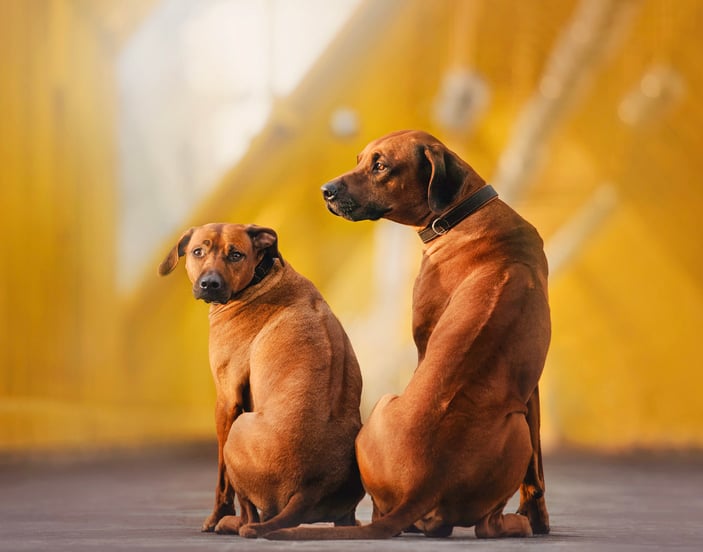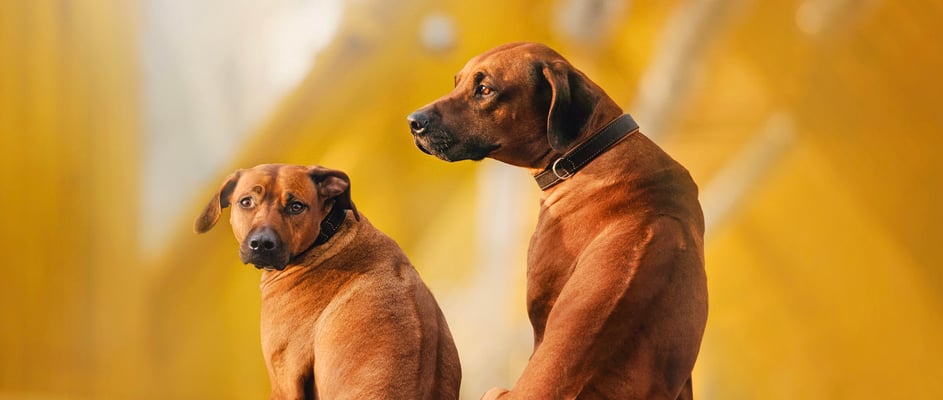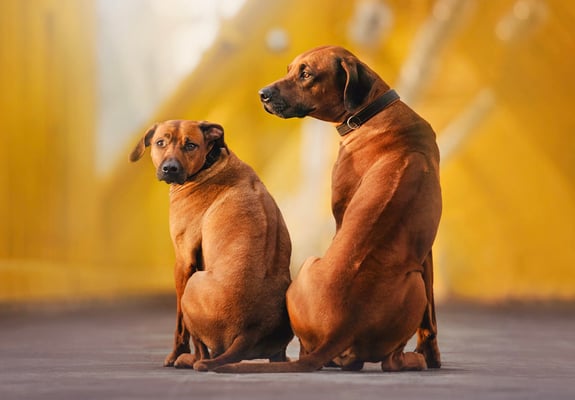The guide to owning a Rhodesian Ridgeback.
Want to know everything there is to know about training your Rhodesian Ridgeback puppy? Submit your email below, and we’ll send you a one-stop guide on all things puppy training!
Jump to:
Stats at a glance.
The history of Rhodesian Ridgebacks.
Let's take a look at the Rhodesian Ridgeback, originally developed in Rhodesia (modern-day Zimbabwe) by European settlers. They needed a robust hunting dog that could track and hold large game like the African lion.
These courageous canines inherited a distinctive ridge of fur down their backs, thanks to the dogs of the Khoikhoi, whose local breeds contributed to today’s Ridgebacks.
The South African Kennel Union established their breed standard in 1922. The Rhodesian Ridgeback club of the United States and the UK both agreed to the standard in 1955.
Being a larger dog, they can be quite aloof and independent in nature, but are also known for their loyalty and connection with their family.
Check out some of the other Big Dog Breeds in the UK for those who love larger companions with a proud working history.
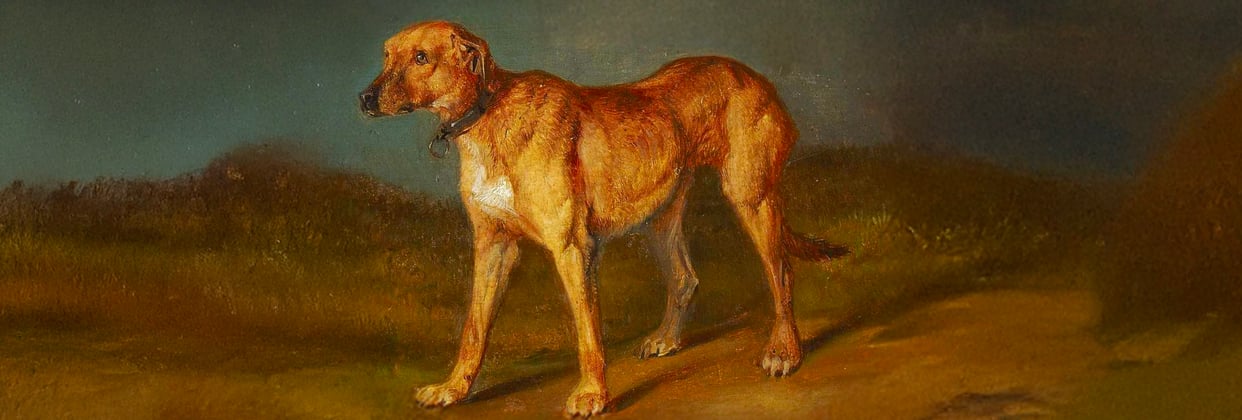

How much is a Rhodesian Ridgeback puppy (UK)?
If you’re thinking of adding a Ridgeback puppy to the family, you’ll want to budget carefully. In the UK, prices can range from £800 to £3,000. This depends on pedigree, registered litters, and whether you’re seeking a show-quality pup or a family companion.
Before you commit, talk with responsible breeders who will show you health certificates, invite you to meet the parents, and share everything about Rhodesian Ridgeback puppies.
Colours and coats.
These majestic pups from Southern Africa are known for their short, sleek coats, typically found in various shades of wheaten.
Some come with darker masks, and occasionally, you might see black hairs intermingling with the lighter fur.
Regardless of colour, the hallmark is always that distinctive ridge of hair that grows in the opposite direction along their spine.
Their coats are considered fairly low-maintenance dog coats, needing minimal grooming compared to, say, curly or silky-haired breeds.
Still, it’s wise to check them regularly for any lumps or skin irritations, or watch for signs of common issues like allergies.
For broader insights into itchy skin or fur troubles, see our article "Most Common Skin Conditions in Dogs."





Size and weight.
This strong, symmetrical breed is taller and heavier than many other hound dog breed types. Males typically stand around 69cm at the shoulder and weigh up to 40kg, while females average about 66cm and weigh closer to 30kg.
They still manage to remain graceful, though they have the muscle of a lion-hunter. If you love big but athletic dogs, these are perfect.
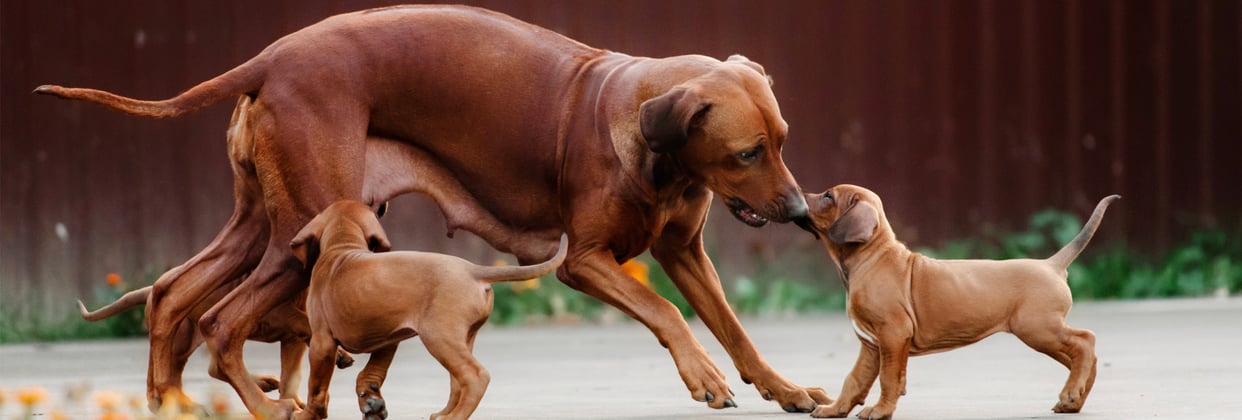

Temperament and behaviour.
Do Rhodesian Ridgebacks make good pets?
Yes, they do. Despite a proud hunting heritage, many Rhodesian Ridgebacks become loyal companions and great family dogs.
They are often described as dignified and intelligent. That said, they can be very independent, so a calm but consistent approach to training helps them thrive. Early socialisation is key, especially if you want them to live comfortably with other pets.
Are Rhodesian Ridgebacks good with kids?
They are generally considered good with children, especially if raised alongside young family members. They often form strong bonds and will keep an eye on the little ones.
Due to their size and strength, teach children to respect the dog’s space and supervise everyone’s interactions. This ensures confident kids and a comfortable canine.
Are Rhodesian Ridgebacks good with cats?
Many Ridgebacks can learn to live peacefully with feline housemates, but remember they were bred as a hunting dog. That prey drive can kick in if your cat sprints across the house.
Early introductions and consistent boundaries help everyone coexist. Temperament also plays a huge role in multi-pet families.
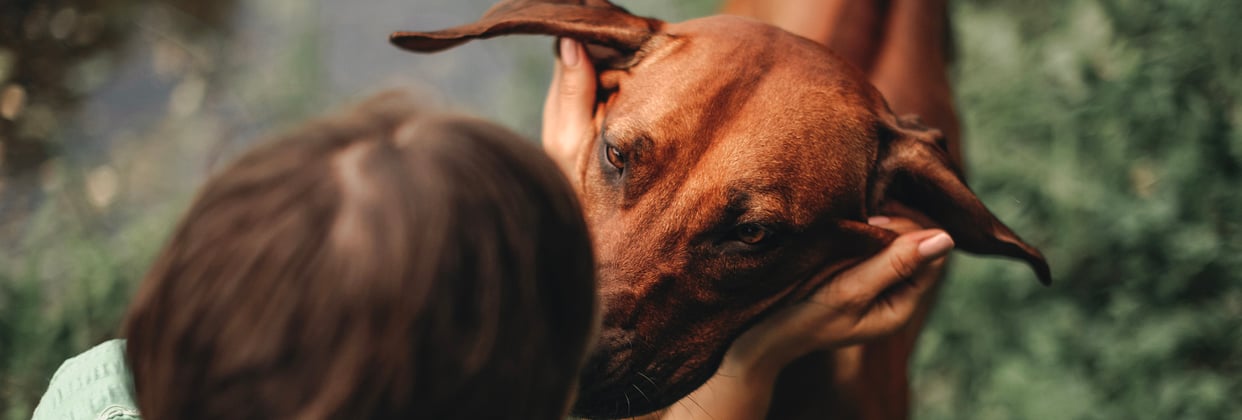

Do Rhodesian Ridgebacks suffer from separation anxiety?
Some can be prone to it. They’re a social breed that bonds tightly with their humans. Leaving them home alone too long may lead to anxious pacing or barking.
Building up “alone time” in increments and offering puzzle toys or interactive feeders helps reduce stress.
If your schedule is demanding, consider daycare, using trusted dog walkers, or roping in a friendly neighbour to drop by.
Can Rhodesian Ridgebacks be left alone?
A few hours is usually fine if they’re properly trained and given daily exercise beforehand. The trick is to burn off energy and leave them something to occupy their curious minds. Too much downtime can lead to destructive chewing or restlessness.
Can Rhodesian Ridgebacks live in apartments?
They can, but it is not recommended. They can adapt to apartment living if you commit to enough exercise. Picture multiple walks plus a long run or a solid play session at the dog park. If you skip that, your Rhodesian Ridgeback might become fidgety in smaller spaces.
Do Rhodesian Ridgebacks bark a lot?
They are not famous for constant barking. They do bark a moderate amount, often to alert you to visitors or if they sense something off. Their bark is deep and commanding, but they’re usually quieter than some other guard dog breed types.
Training a Rhodesian Ridgeback.
Training a Rhodesian Ridgeback takes patience and consistency, but it’s well worth the effort. Start young and keep sessions short to match their attention span.
These dogs respond best to calm, confident guidance, so avoid harsh corrections.
Socialisation is just as important as obedience, so introduce them to different people, places, and pets early on to shape a well-rounded adult dog.
Are Rhodesian Ridgebacks smart?
They are clever and learn quickly, but can be stubborn. This combination means positive reinforcement and variety in training sessions are best. Include short, fun tasks interspersed with praise or yummy treats. You’ll see them excel in dog sports like agility if you start early.
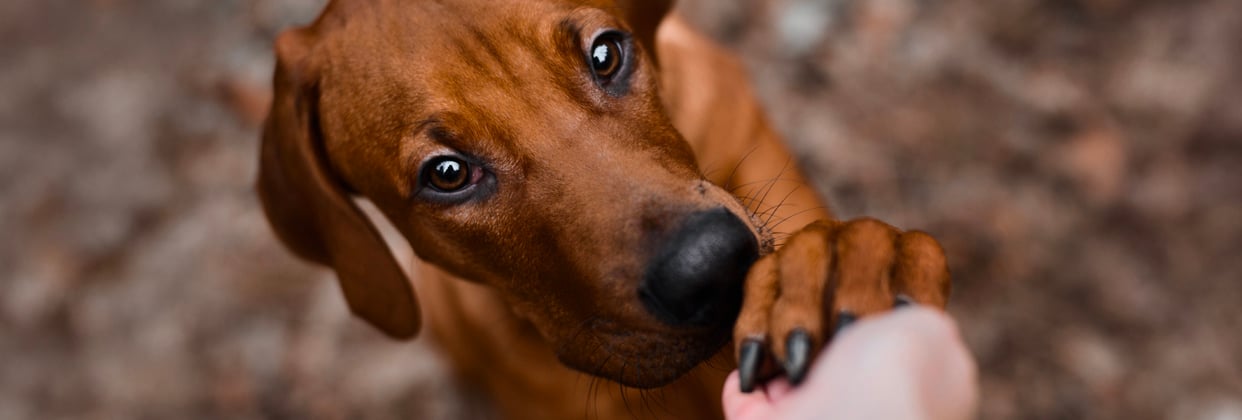

Shedding and grooming.
Their coats shed lightly throughout the year. Weekly brushing with a soft bristle brush or grooming mitt keeps them looking shiny and healthy. An occasional bath, maybe every month or two, is usually enough, as their coats repel dirt and debris quite well.
How often should I brush my Rhodesian Ridgeback?
As we mentioned above, a quick brush once or twice weekly usually does the trick. This helps remove loose hairs and keeps that handsome coat smooth. Regular checks of their spinal cord area (the ridge) and ears are also a good habit, just in case of bumps or infections.
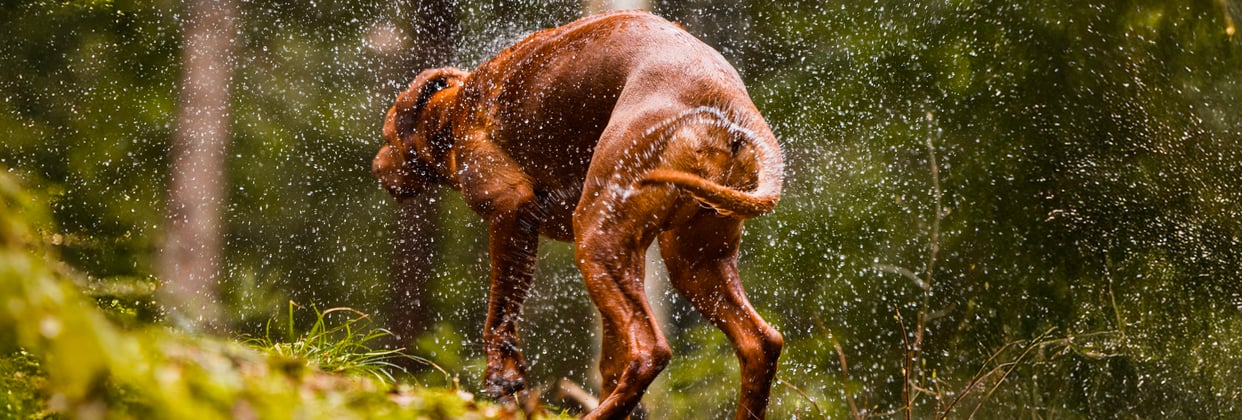

Exercise and mental stimulation.
These dogs thrive on activity. They were once lion trackers, so you’ll want to channel that energy properly.
Aim for an hour or more of walking or running each day. Incorporate sniffy walks where they can explore scents, or use interactive toys to challenge their minds.
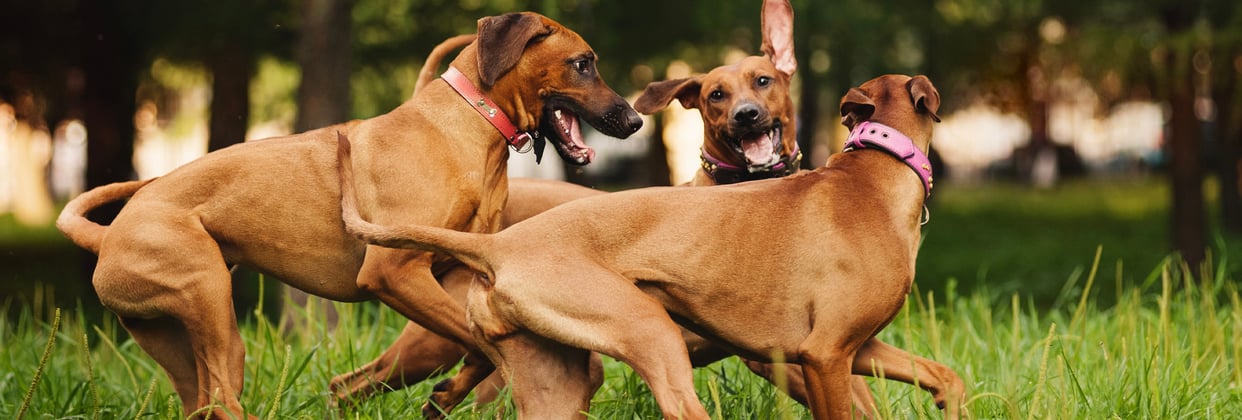

Activities to avoid
They can handle rough terrain, but be wary of letting them jump too high too often while they’re still growing. Those powerful back legs are strong, but it’s worth minimising heavy impact until bones are mature. Also keep your eyes on them if they’re off-lead near wildlife, as their chase instincts are strong.
Perfect Rhodesian Ridgeback activities
Think of daily runs, play sessions with retrieving games, or nose-work tasks. Some owners enjoy canicross or dog sports that let them run. Others find success in sprinting games. If you prefer calmer pursuits, a hiking trail can challenge their nose and stamina in a low-key way.
Feeding and nutrition.
These muscular canines often have healthy appetites, but they can be prone to weight gain if overfed.
Spread their meals into two daily portions. Always choose high-quality food that supports joint and thyroid health, since they can develop issues like hypothyroidism.
Talk with your veterinarian about healthy portion sizes and the right diet for your dog’s age and activity.
Keeping them at a lean weight helps reduce strain on their joints.
Common health issues in Rhodesian Ridgebacks.
Below is a quick overview of conditions this breed club often discusses. If you want to see a similar breakdown for other breeds, check out how we address challenges in dog ownership with smaller pups in our articles.
Note: Costs are approximate and can vary based on location and specific veterinary practices.
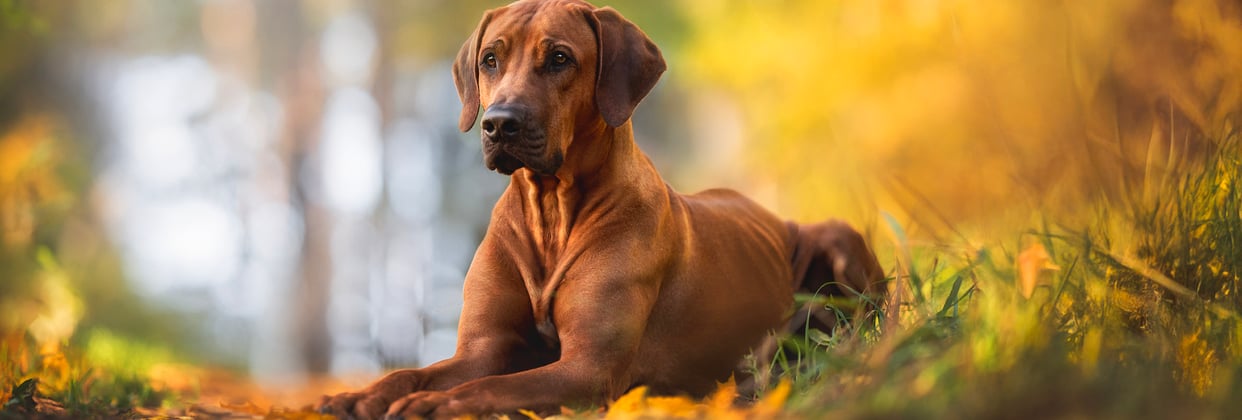

Pet insurance for Rhodesian Ridgebacks.
Considering the possible risks of Rhodesian Ridgeback health, including spinal issues, bloat, or hypothyroidism, it’s wise to explore comprehensive insurance.
We love to enjoy every moment with our big four-legged friends, so it helps knowing we have support for unexpected vet bills.
Our team offers coverage through Rhodesian Ridgeback Pet Insurance, where you can get lifetime coverage for anything from hip dysplasia and elbow dysplasia treatments to everyday vet visits.
You’ll also have access to behaviour and nutrition advice, online vet consultations, and more.
We believe sharing knowledge and experiences helps us all raise happier dogs. When your Rhodesian Ridgeback is well looked after, you’ll have a loyal companion who’ll follow you on every adventure, and probably still try to snuggle on the couch after it all.
